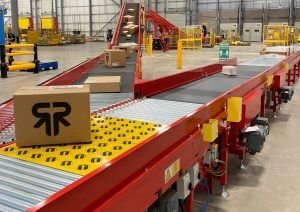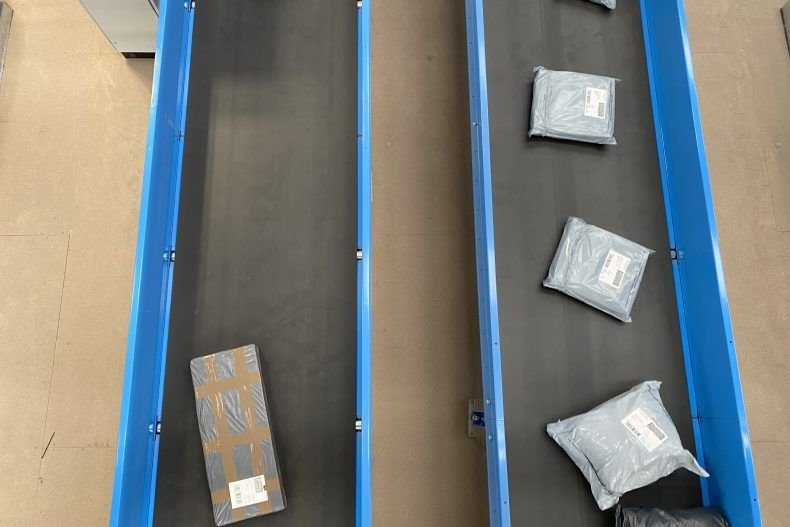Food conveyor belt systems are specialised conveyor systems designed and built to meet the specific hygiene and safety requirements of the food processing and manufacturing industry.
These conveyor systems are crucial in ensuring the sanitary handling and transportation of food products throughout various stages of production, from raw materials to finished goods. The term “food grade” implies that the conveyors adhere to strict standards and regulations to prevent contamination and maintain the integrity of the food being transported.
In the fast-paced and intricate world of the food industry, efficient and hygienic material handling is paramount. Conveyors play a pivotal role in ensuring the smooth flow of ingredients, processed goods, and packaging within food processing facilities but what are the types of conveyor systems used in the Food Manufacturing and Processing industries?
Here we delve into the various types of conveyors specifically designed to meet the unique demands of the food industry.
Food Conveyor Belt Systems
Food conveyor belt conveyors are a crucial part of any material handling operation and are indispensable systems designed for seamless transportation across various industries.
Made in the shape of a loop and equipped with a durable and flexible belt that glides over two or more pulleys, these conveyors provide a reliable means of moving goods with efficiency and precision.
One of the notable advantages of belt conveyors is their ability to transport a wide range of food products when outfitted with food grade belts.
This includes the safe and sanitary movement of raw ingredients, ensuring the integrity of the materials from production to processing. Moreover, these food conveyor belts are adept at carrying packaged goods, contributing to the streamlined flow of products through the various stages of the supply chain.
The design of food grade conveyor belts emphasises both functionality and reliability. The continuous loop design minimises the risk of product spillage and ensures a smooth and continuous flow of materials.
The belt, typically made of high-quality materials, is selected based on the specific requirements of the transported goods, ensuring durability and longevity even in demanding operational environments whilst the frame is constructed of food grade stainless steel of different grades depending on the level of contact it will have with the product preventing corrosion and thus ensuring food safety.
Belt conveyors are an ideal solution for the movement of bulk materials, loose products such as poultry, or packaged items and are commonly used in food production, handling and processing, packaging, and transportation within facilities.
Screw Conveyors
Screw conveyors, renowned for their efficiency and versatility, employ a helical screw blade to facilitate the seamless movement of granular or liquid materials along a predefined path. This design has many benefits, making screw conveyors an indispensable component in the food conveyor systems.
In the context of the food manufacturing sector, screw conveyors offer several advantages that cater to the specific needs and challenges of handling various materials. One key strength lies in their proficiency in managing a diverse range of materials, including powders, grains, and semi-fluid substances.
This adaptability is particularly beneficial in the food industry, where a myriad of ingredients and products with varying textures and forms need to be transported throughout different stages of production.
Screw conveyors are also well-suited for conveying bulk materials such as flour, sugar, and powders in food processing plants and are one of the key conveyor types in food handling.
Bucket Elevators
Bucket conveyors, particularly bucket elevators, are essential in material handling for food processing. Their design, featuring buckets on a rotating chain or belt, efficiently conveys bulk materials vertically.
These conveyors are advantageous for moving goods gently, with their hygienic and easy-to-clean structure. They handle a variety of materials like powders, grains, and nuts, and are ideal for delicate food items such as fruits, vegetables, and fragile snacks.
Pneumatic Conveyors
Pneumatic conveyors, relying on the power of air pressure, offer a dynamic and efficient solution for the transportation of bulk materials such as powders and granular foodstuffs.
Their characteristics make them especially well-suited for applications in the Food Manufacturing and Processing industry, where the careful handling of ingredients and adherence to strict hygiene standards are paramount.
Pneumatic conveyors can be found in use throughout the food industry for the transfer of flour, sugar, and other dry ingredients.
Vibratory Conveyors
Vibratory conveyors are dynamic and versatile material handling systems that leverage vibrations to transport materials along a trough. Their unique design and characteristics make them particularly well-suited for applications in the Food Processing and Manufacturing industry, where the gentle handling of delicate or sticky food products is often crucial.
Ideal for transporting items like frozen foods, snacks, and are well-suited for the Food Processing and Manufacturing industry due to their ability to provide gentle handling of delicate and sticky food products.


